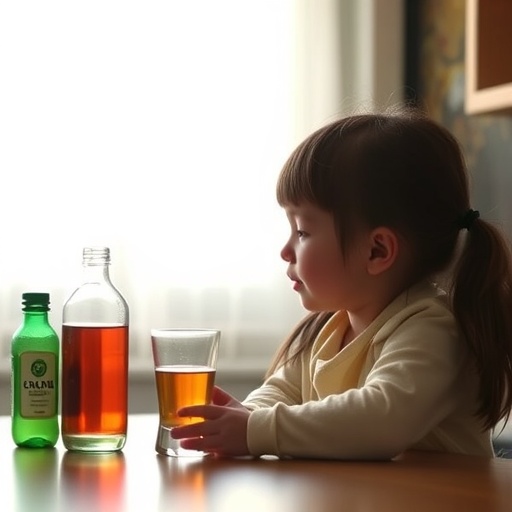Prenatal alcohol exposure constitutes a significant public health concern, impacting approximately 5% of children in the United States. These children frequently exhibit a constellation of ADHD-like symptoms including hyperactivity, impulsivity, and marked deficits in executive function domains such as sustained attention, working memory, and behavioral organization. Conventional pharmacological interventions, such as psychostimulant medications like methylphenidate, tend to have limited efficacy in this subset of patients and, in some cases, may exacerbate symptom severity or lead to intolerable side effects.
The clinical trial, spearheaded by Dr. Joseph O’Neill, an adjunct professor of child psychiatry at UCLA, aims to explore whether nightly application of TNS—a noninvasive brain stimulation technique—can serve as a feasible and effective home-based therapy. The TNS modality functions through electrode patches positioned on the forehead, which deliver gentle electrical impulses targeting the trigeminal nerve during sleep. Activation of this cranial nerve has been shown in prior studies to engage cortical and subcortical regions implicated in attentional control and cognitive regulation.
The U.S. Food and Drug Administration (FDA) preliminarily approved the use of external TNS devices for children aged seven to twelve diagnosed with ADHD in 2019, following clinical evidence demonstrating safety and symptomatic improvement. Nonetheless, the therapeutic potential of TNS in children with prenatal alcohol exposure remains uncharted territory, underscoring the novelty and significance of this investigative effort.
The upcoming two-year pilot trial will enroll 30 children between the ages of eight and twelve who have documented prenatal alcohol exposure and exhibit ADHD-related impairments. Participants’ families will receive the Monarch eTNS device from NeuroSigma, Inc., a Los Angeles-based biotechnology company specializing in neurostimulation technologies. Parents will be instructed to apply the device nightly for a consecutive four-week period, enabling continuous stimulation throughout their child’s sleep cycle.
A critical aspect of the research protocol involves comprehensive monitoring of executive function changes, sleep quality, and any negative or adverse effects potentially arising from the therapy. Both subjective assessments—including parental and child tolerability evaluations—and objective behavioral measures will contribute to a multidimensional appraisal of treatment outcomes and adherence feasibility within a naturalistic, at-home setting.
Should the pilot data reveal promising results regarding safety, tolerability, and preliminary efficacy, the research team plans to advance to a randomized crossover trial, expanding the participant pool and duration. This subsequent phase aims to rigorously validate the therapeutic benefits of TNS while controlling for placebo effects. The National Institute on Alcohol Abuse and Alcoholism (NIAAA) is committed to supporting this expansion with grant funding reaching up to $2.1 million over three years.
From a neurological perspective, trigeminal nerve stimulation capitalizes on an accessible peripheral nerve that transmits sensory information to brainstem nuclei interconnected with key attentional networks. By applying calibrated electrical pulses, TNS may facilitate neuroplastic changes and improve dysregulated neural circuits implicated in ADHD pathophysiology, particularly in children whose neurodevelopment has been compromised by fetal alcohol exposure.
While pharmacotherapy remains the mainstay in ADHD management, the search for alternative, non-pharmacological interventions is urgent, especially for children who experience adverse reactions or inadequate response to medications. The prospect of a safe, user-friendly, and non-addictive intervention that can be administered during sleep holds transformative potential for clinical practice and quality of life for affected families.
Dr. Mary O’Connor, professor emerita at the UCLA David Geffen School of Medicine and co-lead on the study, expressed enthusiasm about the potential impact this research could yield. She emphasized the urgent need for innovative treatments tailored to the unique neurocognitive profiles of children affected by prenatal alcohol exposure, who frequently face lifelong challenges and societal stigma.
In a broader context, this research exemplifies the fusion of neuroscience, medical device innovation, and child psychiatry, epitomizing how targeted neurostimulation can revolutionize the management of complex neurodevelopmental disorders. Should the MONARCH eTNS device prove successful, it may herald a new era where sleep-based neurotherapies complement or even substitute pharmacological treatments, offering personalized and accessible care.
As the scientific community closely follows this trailblazing study, the hope is that it will catalyze further investigation into the mechanisms underpinning ADHD and related cognitive impairments. Ultimately, the knowledge gained may inform the development of more refined neuromodulation strategies, paving the way for improved neurodevelopmental outcomes in vulnerable pediatric populations worldwide.
Subject of Research: People
Article Title: Not provided
News Publication Date: Not provided
Web References:
FDA Clearance of TNS Device: https://www.fda.gov/news-events/press-announcements/fda-permits-marketing-first-medical-device-treatment-adhd
References: Not provided
Image Credits: Not provided
Keywords:
Attention deficit hyperactivity disorder, Children, Clinical trials, Sleep, Developmental disabilities, Cognitive control, Mental health, Wearable devices, Attention, Psychiatry, Electrodes, Scientific approaches, Clinical research, Research on children
Tags: ADHD treatment for childrenalternative ADHD therapiesclinical trial for ADHD symptomsdrug-free ADHD interventionsexecutive function deficits in childrenneurostimulation device for ADHDnoninvasive brain stimulation techniquespediatric mental health innovationsprenatal alcohol exposure effectstrigeminal nerve stimulation therapyUCLA Health research studieswearable device for neurotherapy





